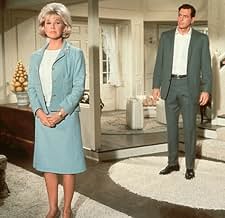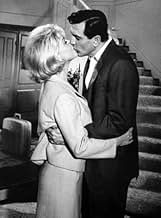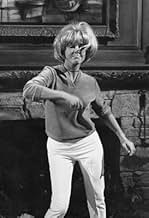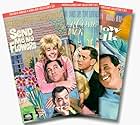AVALIAÇÃO DA IMDb
6,9/10
7,8 mil
SUA AVALIAÇÃO
Adicionar um enredo no seu idiomaWhen a hypochondriac believes he is dying, he makes plans for his wife--which she discovers and misunderstands.When a hypochondriac believes he is dying, he makes plans for his wife--which she discovers and misunderstands.When a hypochondriac believes he is dying, he makes plans for his wife--which she discovers and misunderstands.
- Direção
- Roteiristas
- Artistas
- Prêmios
- 1 vitória e 1 indicação no total
John Alban
- Commuter
- (não creditado)
Don Anderson
- Country Club Member
- (não creditado)
Shirley Anthony
- Country Club Member
- (não creditado)
Herschel Bernardi
- TV Announcer
- (narração)
- (não creditado)
Paul Bradley
- Country Club Member
- (não creditado)
- Direção
- Roteiristas
- Elenco e equipe completos
- Produção, bilheteria e muito mais no IMDbPro
Avaliações em destaque
7tavm
Different from their previous two film teamings, Doris Day and Rock Hudson are actually husband and wife throughout instead of just getting married by the end of their other ones. And third co-star from those same two movies-Tony Randall-is also married this time though we never see his wife or offspring here! Anyway, Hudson mistakenly thinks he's about to die due to some selective overhearing of his doctor when he's in the rest room and only Randall knows initially. That premise drives much of the plot with Randall, especially, getting some good laughs from his behavior from that point on. Ms. Day, herself, has some amusing moments at the beginning and some good slapstick scenes though one sequence involving an out-of-control golf cart was, perhaps, a little too much. Hudson, well, he seems even more comfortable doing comedy scenes than his previous two films with Day and Randall and partly seemed to really have a ball here, that's for sure! There's also good supporting turns from Edward Andrews as Hudson's doctor and Paul Lynde as a funeral director who seems too enthusiastic for his job! My mom and I really enjoyed this one so that's a recommendation for Send Me No Flowers.
While not terribly well received here on IMDb, this is in my opinion the best of the three Hudson/Day/Randall teamings. While Pillow Talk remains fresh and sharp fifty years later (with Lover Come Back being a rather unfortunate and less enjoyable recycling of the same script), it is Send Me No Flowers that gets the most air-play of the three in our home video library.
From the superb opening theme song performed by Doris Day, we are transported into the beautiful suburbia of yesteryear. Rock Hudson's George Kimball is absolutely hilarious as the king of all hypochondriacs (if you've ever known such a person, you'll die laughing). And for 1964 it makes some rather amusing and insightful observations into the nature of medicinal advertising. Ms. Day plays wife Judy Kimball; she is a delight as always and it's perhaps the most satisfying aspect of the screenplay that at last Hudson and Day are married and thus involved in a relationship that extends beyond never-realized innuendo. Randall plays the usual right-next-door character attached to Hudson's, Arnold Nash, and again this is the best of the virtually identical characters he plays in the three movies they made together.
Being the hypochondriac that he is, Kimball misinterprets a conversation he overhears at the doctor's office and subsequently believes he is dying. Once he and his accomplice Arnold absorb the blow, they set about to find a suitable replacement husband for Judy to marry once George is gone. It's really a rather touchingly honorable intention and also generates the bulk of the misunderstandings that constitute the remainder of the film.
There are some negatives, these are things we see through our 21st century eyes and were certainly never intended to be offensive at the time. These mainly revolve around Day's character; Judy Kimball is a beautiful and intelligent woman, but is given no other pastimes in the entire course of the film other than playing golf and preparing her husband's breakfast. And despite being beautiful and intelligent, George apparently considers her to be too big of an idiot to ever possibly survive without him, and thus he must find a man to take care of her once he is gone. She has no children, no occupation, doesn't understand a mortgage, can't write a check to the gas station correctly, her greatest interest is in the impending divorce of a neighbor she doesn't even know and she apparently doesn't even know what she pays for groceries. We are clearly shown George's greatest dread as he imagines a number of scenarios in which Judy evidently has no judgment whatsoever and is easy prey to any slick con artist that should come along once she is widowed. It might also be said that this is absolutely typical of the way virtually all women are depicted in movies and television of this era.
Like all three of the Hudson/Day/Randall comedies, this one is lush and colorful, with exquisite sets and wardrobe. The supporting cast are excellent, particularly Paul Lynde as the cemetery proprietor and Edward Andrews as Kimball's exasperated physician. This film carries a warm, comfortable feel of a happier bygone era and packs lots of laughs. Highly recommended.
From the superb opening theme song performed by Doris Day, we are transported into the beautiful suburbia of yesteryear. Rock Hudson's George Kimball is absolutely hilarious as the king of all hypochondriacs (if you've ever known such a person, you'll die laughing). And for 1964 it makes some rather amusing and insightful observations into the nature of medicinal advertising. Ms. Day plays wife Judy Kimball; she is a delight as always and it's perhaps the most satisfying aspect of the screenplay that at last Hudson and Day are married and thus involved in a relationship that extends beyond never-realized innuendo. Randall plays the usual right-next-door character attached to Hudson's, Arnold Nash, and again this is the best of the virtually identical characters he plays in the three movies they made together.
Being the hypochondriac that he is, Kimball misinterprets a conversation he overhears at the doctor's office and subsequently believes he is dying. Once he and his accomplice Arnold absorb the blow, they set about to find a suitable replacement husband for Judy to marry once George is gone. It's really a rather touchingly honorable intention and also generates the bulk of the misunderstandings that constitute the remainder of the film.
There are some negatives, these are things we see through our 21st century eyes and were certainly never intended to be offensive at the time. These mainly revolve around Day's character; Judy Kimball is a beautiful and intelligent woman, but is given no other pastimes in the entire course of the film other than playing golf and preparing her husband's breakfast. And despite being beautiful and intelligent, George apparently considers her to be too big of an idiot to ever possibly survive without him, and thus he must find a man to take care of her once he is gone. She has no children, no occupation, doesn't understand a mortgage, can't write a check to the gas station correctly, her greatest interest is in the impending divorce of a neighbor she doesn't even know and she apparently doesn't even know what she pays for groceries. We are clearly shown George's greatest dread as he imagines a number of scenarios in which Judy evidently has no judgment whatsoever and is easy prey to any slick con artist that should come along once she is widowed. It might also be said that this is absolutely typical of the way virtually all women are depicted in movies and television of this era.
Like all three of the Hudson/Day/Randall comedies, this one is lush and colorful, with exquisite sets and wardrobe. The supporting cast are excellent, particularly Paul Lynde as the cemetery proprietor and Edward Andrews as Kimball's exasperated physician. This film carries a warm, comfortable feel of a happier bygone era and packs lots of laughs. Highly recommended.
I stumbled across this movie one morning. I don't usually like comedies from this era, but I really liked this one. It is very cute and funny and just perfect. The three are a great team and Tony Randall is especially funny. I recommend it to all.
Another self-opinionated reviewer bites the dust. Having blithely pronounced "Lover Come Back" to be the best of the three Day-Hudson comedies without even having seen this one, I now willingly eat crow and and say I was wrong. "Send Me No Flowers" is the best. "It's a honey!"
This is a wonderful suburban world of lawns and yards, bridge games and country clubs, commuter trains and divorce rumours. George Kimball (Rock) is a malade imaginaire, and Judy (Doris)is ... well, blonde. Tony Randall is at his considerable best as the nerdy neighbour Arnold who gets entangled in the Kimballs' misunderstandings, with delicious comic consequences. Paul Lynde turns in a marvellous cameo as Mister Akins of the funeral parlour, and the annoyingly perfect Bert Power is played with breezy confidence by Clint Walker, TV's Cheyenne (the incidental music gives him a witty little cowboy theme).
"My hypochondria has finally paid off," announces George after hearing (and misconstruing) his doctor's talk of impending mortality. Arnold prepares a eulogy which mentions George's 'unfailing good humour', a phrase which could stand as the movie's subtitle. Hudson is masterly as the doom-laden George, showing how assured he can be when the material is strong. This well-crafted script is derived from a Broadway play, and its quality shines through. Doris wears a very prominent wig and, in true Doris style, keeps her bra on under her negligee.
Made in 1962 when television had clearly won the battle against the cinema, the film uses TV's ascendancy in a very knowing way in the opening gag.
Verdict - Near-faultless domestic comedy with great work by Hudson, Day, Randall and Lynde.
This is a wonderful suburban world of lawns and yards, bridge games and country clubs, commuter trains and divorce rumours. George Kimball (Rock) is a malade imaginaire, and Judy (Doris)is ... well, blonde. Tony Randall is at his considerable best as the nerdy neighbour Arnold who gets entangled in the Kimballs' misunderstandings, with delicious comic consequences. Paul Lynde turns in a marvellous cameo as Mister Akins of the funeral parlour, and the annoyingly perfect Bert Power is played with breezy confidence by Clint Walker, TV's Cheyenne (the incidental music gives him a witty little cowboy theme).
"My hypochondria has finally paid off," announces George after hearing (and misconstruing) his doctor's talk of impending mortality. Arnold prepares a eulogy which mentions George's 'unfailing good humour', a phrase which could stand as the movie's subtitle. Hudson is masterly as the doom-laden George, showing how assured he can be when the material is strong. This well-crafted script is derived from a Broadway play, and its quality shines through. Doris wears a very prominent wig and, in true Doris style, keeps her bra on under her negligee.
Made in 1962 when television had clearly won the battle against the cinema, the film uses TV's ascendancy in a very knowing way in the opening gag.
Verdict - Near-faultless domestic comedy with great work by Hudson, Day, Randall and Lynde.
The main character is dying, but not the movie! It shall live forever. This is one of five golden, grown-up comedy classics Doris Day starred in, the others being "Teacher's Pet", "Pillow Talk", "That Touch of Mink" and "Lover Come Back". Of course, Hollywood never gives an Oscar for comedy. Drama is deemed deep! Nothing is deeper than comedy. Actually, drama is often unintentional comedy.
The critics disliked the movie because the subject is grim: terminal illness, or fear thereof. But if you take that attitude, nothing at all is funny. Actually, death is just the theme around which a lot of variations about modern life are spun. This film is masterful in every respect, a real treat. Paul Lynde is priceless as the effeminate undertaker. Doris Day is a miracle. Even the theme song is a thrill. Oh, why did we stop making these clean, domestic movies dealing with practical issues and everyday life?
The critics disliked the movie because the subject is grim: terminal illness, or fear thereof. But if you take that attitude, nothing at all is funny. Actually, death is just the theme around which a lot of variations about modern life are spun. This film is masterful in every respect, a real treat. Paul Lynde is priceless as the effeminate undertaker. Doris Day is a miracle. Even the theme song is a thrill. Oh, why did we stop making these clean, domestic movies dealing with practical issues and everyday life?
Você sabia?
- CuriosidadesGene Kelly was originally signed to direct, but exited when he failed to get Warren Beatty and then Bobby Darin to star.
- Erros de gravaçãoWhen Dr. Morrissey is delivering fish to Judy, she mentions that George is dying. Dr. Morrissey starts laughing and sits down, taking his glasses off. In the next shot the glasses are back on.
- Citações
George Kimball: When a man's wife thinks he's having an affair, how can he convince her he's not?
Arnold Nash: He can't.
George Kimball: But I'm not having one!
Arnold Nash: Doesn't make any difference.
George Kimball: Isn't a man innocent until proven guilty?
Arnold Nash: Look, you're dealing with your wife. You can forget the Constitution.
- Cenas durante ou pós-créditosOpening credits prologue: "The desire to take medicine is perhaps the greatest feature which distinguishes man from animals." Sir William Osler
- ConexõesFeatured in A Família Buscapé: Jed Becomes a Movie Mogul (1964)
Principais escolhas
Faça login para avaliar e ver a lista de recomendações personalizadas
- How long is Send Me No Flowers?Fornecido pela Alexa
Detalhes
- Data de lançamento
- País de origem
- Idiomas
- Também conhecido como
- Send Me No Flowers
- Locações de filme
- Empresa de produção
- Consulte mais créditos da empresa na IMDbPro
Bilheteria
- Faturamento bruto nos EUA e Canadá
- US$ 9.129.247
- Tempo de duração
- 1 h 40 min(100 min)
- Cor
- Proporção
- 1.85 : 1
Contribua para esta página
Sugerir uma alteração ou adicionar conteúdo ausente






































